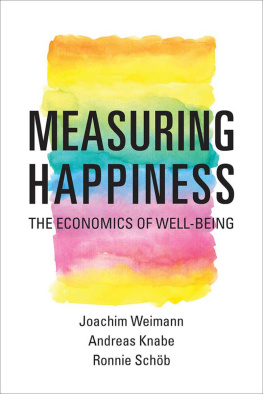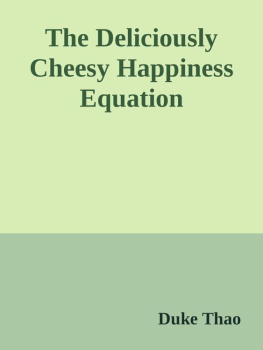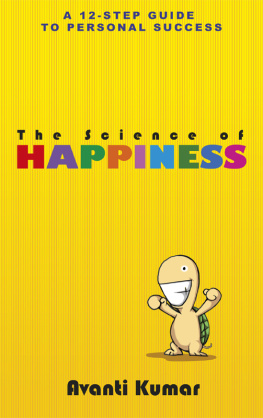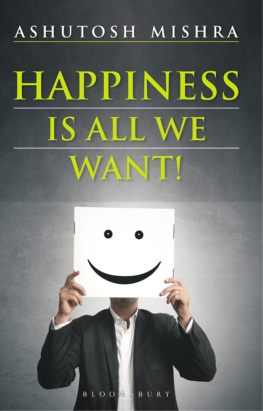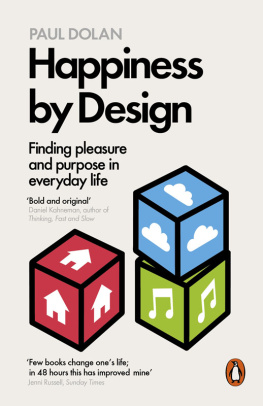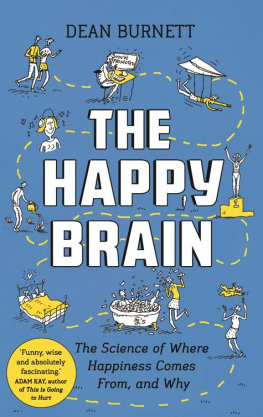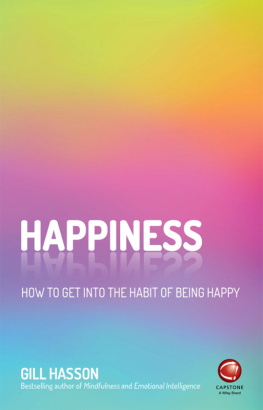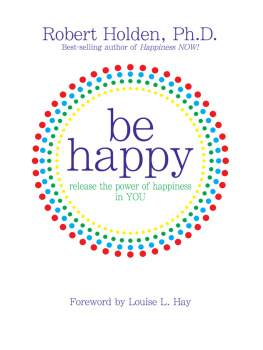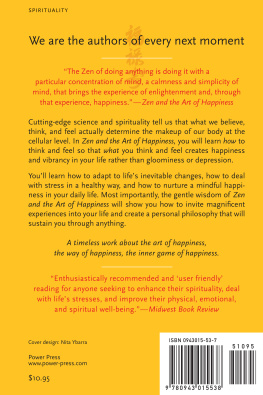Measuring Happiness
Measuring Happiness
The Economics of Well-Being
Joachim Weimann, Andreas Knabe, and Ronnie Schb
The MIT Press
Cambridge, Massachusetts
London, England
2015 Massachusetts Institute of Technology
Original German-language editionGeld macht doch glcklich: Wo die konomische Glcksforschung irrt (ISBN 978-3-7910-31941)published by Schffer-Poeschel Verlag fr Wirtschaft, Steuern und Recht GmbH, Stuttgart ( 2011).
All rights reserved. No part of this book may be reproduced in any form by any electronic or mechanical means (including photocopying, recording, or information storage and retrieval) without permission in writing from the publisher.
Library of Congress Cataloging-in-Publication Data
Weimann, Joachim, 1956
[Geld macht doch glcklich. English]
Measuring happiness : the economics of well-being / Joachim Weimann, Andreas Knabe, and Ronnie Schb.
p. cm.
Includes bibliographical references and index.
ISBN 978-0-262-02844-8 (hardcover : alk. paper)
ISBN 978-0-262-32372-7 (retail e-book)
1. Quality of lifeEconomic aspects. 2. Well-beingEconomic aspects. 3. HappinessEconomic aspects. 4. MoneyPsychological aspects. 5. WealthPsychological aspects. 6. EconomicsPsychological aspects. I. Knabe, Andreas. II. Schb, Ronnie III. Title.
HN25.W4313 2015
306dc23
2014019585
to our families
Contents
Preface
We noticed during our research on life satisfaction that we were dealing with a theme that touches many people. Around this theme there are many myths, open questions, and small mysteries. A theme with such characteristics is perfect for a thrilling work of nonfiction. And so our book came to be. It should be a thrilling book, entertaining to read but still reporting on the latest scientific developments. This book was preceded by much preliminary work. The beginning was marked by an extensive study that we conducted on the issue of the life satisfaction of unemployed and employed people. We would like to express particular thanks to the Fritz Thyssen Stiftung, which funded that study. Substantial preliminary work took place within the framework of a report we prepared for Germanys Bundesministerium der Finanzen (Federal Ministry of Finance).
We originally published this book in German under the title Geld macht doch glcklich: Wo die konomische Glcksforschung irrt. The book received positive feedback from colleagues in academia and appreciative reviews in the German-speaking popular media. This encouraged us to bring it to the attention of an international audience. We would not have been able to do so without the help of our translator, Brian Browne, who did a wonderful job of not only thoroughly translating the content of the book but also carrying over its somewhat colloquial style. We are grateful for the effort he put into the project. We also want to thank the Brsenverein des deutschen Buchhandels (Association of the German Publishing Trade) for supporting the translation financially.
We would especially like to thank all those whose assistance helped bring this book to fruition. Christine Bayer-Schb and Sarah Schb read and commented as meticulously as Barbara Weimann, and Christine Lcke, Alexander Plum, and Florian Timme carried out valuable work researching the literature and the data. Our thanks go to them and to Paul Bethge and John Covell of the MIT Press, who worked on the project with energy and dedication.
Joachim Weimann, Andreas Knabe, and Ronnie Schb
Berlin and Magdeburg, June 2014
I
The Economics of Happiness and Its MostImportant Results
1
The End of Materialism?
The question of what makes people happy is very old, and it hasnt been answered yet. Or perhaps, to be more precise, we can say that there are many answers to the question. The influence of the spirit of the age on how the question is answered shouldnt be underrated. After the Second World War, it was quite clear what people in the Western world wanted and what could be done to make them happy: Make them forget the horrors of war and help them to overcome the hardships that arose from it. Above all, people wanted economic prosperity and a future they could believe in. In postwar Western societies, striving for happiness meant, first and foremost, striving for prosperity and security.
The European student revolts of 1968 and the peace movement in the United States marked the dawn of a new age in which other values began to gain ground against the predominance of these earlier goals. Political participation, emancipation, and the desire in general to dare more democracy (as Willy Brandt put it) appeared alongside the strictly material goals. But the desire for higher income and better living conditions held its ground against the emerging environmental and civil rights movements of the 1970s and the 1980s. In Europe, the environmental movement succeeded in promoting ecological awareness and firmly establishing an understanding of environmental interrelationships in society. However, even these successes didnt prevent people from striving for material things. And that has changed little to this day.
But is money really everything? Of course not, but that has never been the point. What has always mattered is having the money to buy goods and being able to afford the things that we assume make us happy. This includes paying for the necessities of life just as much as taking vacation trips, attending cultural events, and generally taking the time to enjoy the fruits of our labor. That is attested by the simple fact that over the last hundred years incomes have increased and working hours have decreased considerably (Lee et al. 2007). Our economic prosperity is continually risinga fact we lose sight of in the midst of daily reports of crises, problems, maladministration, and grievances. It nevertheless remains a fact. With our hard work and ambition we ensure that material progress doesnt come to a standstill. Slow growth is perceived as problematic, an economy that isnt growing is thought to be in crisis, and a decline in economic performance is considered a catastrophe. And yet we are currently experiencing an ever-increasing readiness in society to enter into a debate on whether we have taken things much too far.
The fundamental themes of this discussion are whether there are not more important values than economic prosperity and whether striving for economic prosperity is likely to violate those values. Today this theme comes in many shapes and sizes and is generally orchestrated against consumerism, neoliberalism, and the other usual suspects. But this isnt completely new. The green movement, the peace movement, and especially the student movement were linked to widespread criticism of capitalism, which was sparked by, among other things, an excessively strong orientation toward materialistic values. But in the past only relatively small segments of society backed such criticismsmall groups that, although they attracted a great deal of attention, never really got beyond the status of a minority.
Nowadays, however, this discussion is taking place in mainstream society and in parliaments and has managed to penetrate the inner circles of economic debate. Economists on a broad front are dealing with the question of what makes people happyand this is rather an unusual task for economists. Why it is unusual is a long story. We will tell a small part of the story in the next chapter, and the whole story in the appendix.
At the political level there is a debate on the question of whether it still makes sense to continue to use gross domestic product (GDP) to assess the situation of a country. (In the past, a related measuregross national product, abbreviated GNPwas more commonly used.) To put it simply, GDP measures economic performance by adding up the value of all the goods and services produced within a country. Thus, GDP is confined to the strictly material. But arent we making a mistake if we rely entirely on this one measure? Shouldnt other measures be taken into account? Economic prosperity is, of course, not an end in itself, but it serves as an indicator of peoples happiness. At the same time, we are assuming tacitly that people are better off when they are better provided for and when they are able to consume more. Is this assumption admissible? Arent we in danger of overlooking happiness if we only use material things in the form of GDP as our yardstick?
Next page
